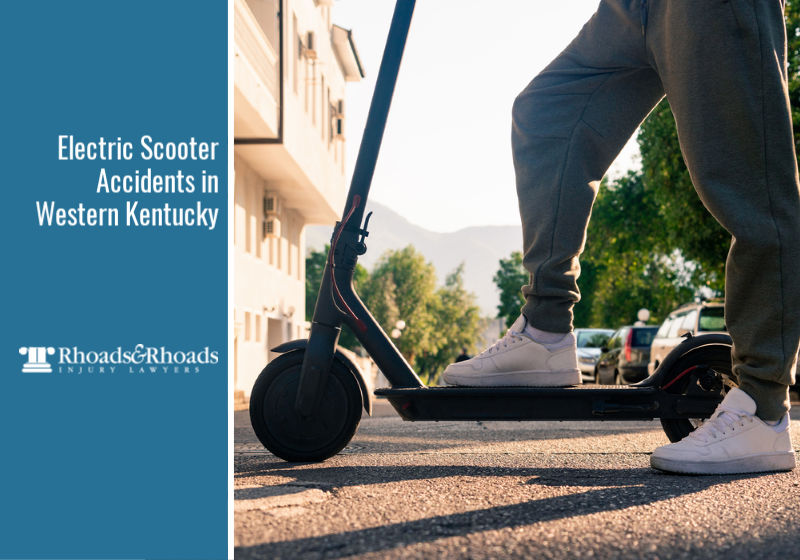
Key Points of This Article:
- In Western Kentucky, electric stand-up scooters are becoming a more common form of micro-transportation and a way for college students to commute to and from campus.
- Scooter drivers are exposed, with no metal frame to protect them in the case of a collision like they would have when riding in a traditional passenger car.
- Common causes of electric scooter accidents include negligent car or truck drivers, distracted pedestrians, and alcohol and drug impairments.
- Bicycle injury data shows that electric stand-up scooter riders suffer a higher proportion of head injuries making helmet use a must.
Throughout western Kentucky communities, especially those home to University of Kentucky students, small micro-mobility equipment, such as electric bikes and stand-up scooters, are becoming a common form of personal transportation that is both affordable and accessible to students. However, the economic travel convenience comes with other risks. Electric stand-up scooters leave riders exposed, with no steel or aluminum frame to protect them as they would have in a traditional motor vehicle.
And as stand-up electric scooters are popping up across more Kentucky cities, many of the people riding them are ending up in the emergency room with serious injuries. Some of the common causes of electric scooter accidents include:
- Negligent car, truck, and motorcycle drivers
- Defective sidewalks and damaged roads
- Drivers or pedestrians who are distracted
- Drug and alcohol impairments
- Careless, reckless, or intentional actions of others
A report published in JAMA Surgery shows a growing number of electric scooter accidents are resulting in a head injury or death. The study also confirmed that between 2014 and 2018, nearly 3,300 patients were admitted to U.S. hospitals with scooter-related injuries, a 365% increase from the previous comparison. Total scooter injuries in that same time period totaled over 39,000, an alarming 222% jump, although the actual rate may be under-reported.
Kentucky law does not allow cities to ban personal electric scooter use, but each community can regulate where they can go, where they can park, and how they should and should not be used. These stand-up electric scooters are often seen traveling in Madisonville and Owensboro, and in Bowling Green in Warren County, and Lexington in Fayette County. Lime rental scooter services were also introduced in Lexington in October 2019. Not a month later, the Fayette County Coroner’s Office reported a 35-year-old man died following a scooter crash.
Head Injuries Are Higher in Scooter Accidents Than Bicycle Crashes
While fractures are the most common injuries seen in scooter accidents, followed by contusions and abrasions, scooter riders also suffer a higher proportion of head injuries, resulting from the head being stricken, suddenly jerked, or penetrated by a foreign object. In Kentucky, approximately 30,000 brain injuries occur each year, some traumatic and leaving thousands of people to experience the ongoing struggle of long-term disability battles and financial challenges.
A traumatic brain injury (TBI) is defined as an alteration in brain function, or other evidence of brain pathology, caused by an external force. The needs of TBI victims, and their family caretakers, can vary greatly depending on the severity and type of brain injury.
Also, whiplash can occur when a person’s neck and head are suddenly forced backward and then again forward, putting the cervical spine through too fast motions and extreme, quick stresses. Most cases of whiplash occur as a result of rear-end car crashes but can also happen when an electric scooter is struck by a motor vehicle. Severe whiplash can cause changes to occur throughout the structures in and surrounding the brain, triggering a cerebral hemorrhage or life-threatening concussion, resulting in each to become a potential source of chronic debilitating pain or death.
Motor Vehicle and Traffic Injuries Are Leading Cause of TBI-Related Death
Head injuries most often require extended therapy or invasive surgeries that take months of rehabilitation and recovery time, but can also lead to death. TBI-related death rates are highest for adults aged 20 to 24 years. Most of these individuals have a combination of injuries to the brain, such as:
- Concussion: A mild head injury that can cause a brief loss of consciousness and usually does not cause permanent brain injury.
- Diffuse axonal injury (DAI): A shearing and stretching of the nerve cells at the cellular level. It occurs when the brain quickly moves back and forth inside the skull, tearing and damaging the nerve axons. Axons connect one nerve cell to another throughout the brain, like telephone wires. Widespread axonal injury disrupts the brain’s normal transmission of information and can result in substantial changes in a person’s wakefulness.
- Traumatic Subarachnoid Hemorrhage (tSAH): Bleeding into the space that surrounds the brain. This space is normally filled with cerebrospinal fluid (CSF), which acts as a floating cushion to protect the brain. Traumatic SAH occurs when small arteries tear during the initial injury. The blood spreads over the surface of the brain, causing widespread effects.
Contusion and hematoma are injuries involving specific areas of the brain and may require surgery.
While several Kentucky cities are now considering how to move forward with regulating stand-up electric scooters for rent or personal travel, helmet use is associated with a lower risk of head injury and should also be considered.
Western Kentucky Electric Scooter Injury Attorneys
Rhoads & Rhoads has been protecting the rights of the injured throughout Western Kentucky for over four decades. If you or a loved one was riding an electric scooter and injured due to the negligence of another, our team of experienced trial attorneys and support staff are available to help you through this difficult time and get you the financial recovery you deserve.
We offer free initial consultations, and all cases are taken on a contingency fee basis. This means there is no payment required upfront, and there is NO RISK involved. Call us at 888-709-9329 to schedule your consultation today.
Watch: Can Social Media (Facebook) Hurt My Injury Claim?


